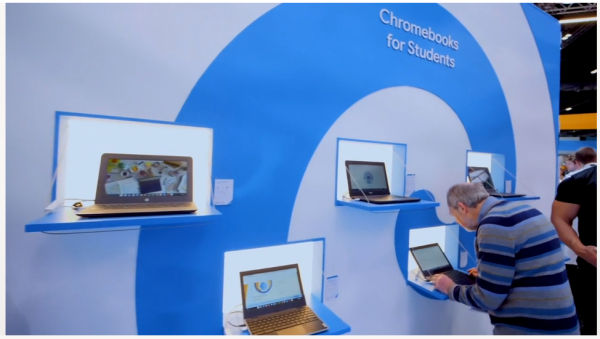| Google Promotes ChromeOS at Google I/O |
| Written by Nikos Vaggalis | |||
| Monday, 13 May 2019 | |||
|
Google seems determined to push heavily for ChromeOS ChromeOS is an ever-evolving operating system. At last year's Google I/O, its integration with Linux was announced, so that devs could use it create Linux apps. This year you can also create Android apps more easily than before. First, the intersection of those three OS - ChromeOS, Linux and Android- is being facilitated by easier file sharing since now you can use the file manager to move your files safely across all three platforms. Second, networking gets its share of the action too, as interoperation between Linux and ChromeOS can now be done through networking services - I guess with something like Named Pipes? And third, Google's attempt to brand ChromeOS as an all-encompassing OS for developers couldn't ignore Android Studio's presence. Studio could already run on ChromeOS, but the process now has been reduced to a mere double-click on the binary. You can now make your Android applications on ChromeOS and push the APKs to your mobile phones.
Saying that, it's not clear what Google is trying to do. Is it trying to integrate ChromeOS and Android at the expense of the latter? The reasoning goes like this: People are using apps across different devices that blur the lines between mobile and desktop — from attaching keyboards to their tablets to using their smartphones to project onto a desktop screen. And no matter what device they’re using, they expect apps to deliver a seamless experience every time. In that war could ChromeOS be the one that takes home the spoils? This could be the case as, apart from Chromebooks, ChromeOS now runs on tablets and even laptops of the lower spectrum. The Neverware project, for instance, has been an immediate success with schools, as it can power low-end devices which would otherwise be thrown away, thus saving lots of money, with its CloudReady OS. CloudReady is itself based on Google’s ChromiumOS, the popular distribution of Chrome OS. We will watch closely as the story evolves.
More InformationWhat’s new in Chrome OS? A faster, simpler, and more secure environment for Web and Android developers Related ArticlesChromebook Tablets - The End of Android?
To be informed about new articles on I Programmer, sign up for our weekly newsletter, subscribe to the RSS feed and follow us on Twitter, Facebook or Linkedin.
Comments
or email your comment to: comments@i-programmer.info |
|||
| Last Updated ( Monday, 13 May 2019 ) |



